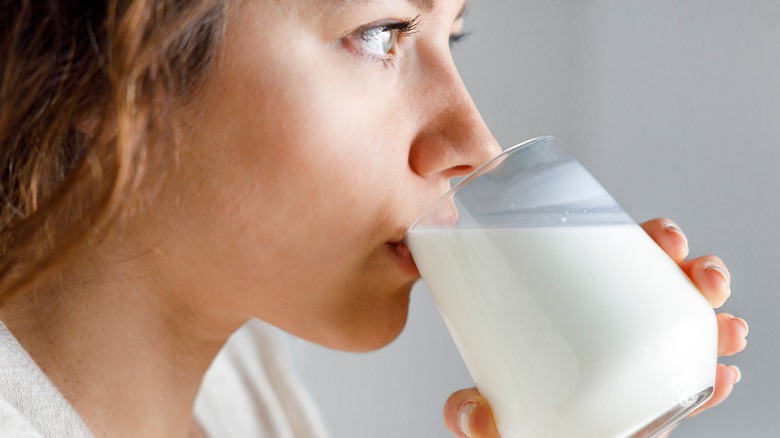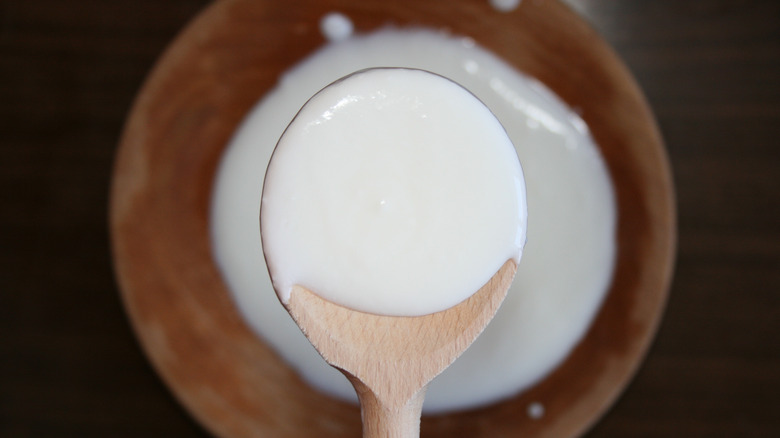Is Drinking Milk Good Or Bad For Your Eyes? What The Experts Say
When it comes to eye health, we know for a fact that vegetables stand at the top of the list. We're talking carrots, kale, bell peppers, and other leafy greens like spinach and broccoli.
But what about milk? The information on the internet can be confusing when it comes to milk, with some claiming that drinking milk every day might lead to plaque or calcium buildup in the eyes and others saying there's no truth to it. According to Minneapolis-based retina specialist Dr. Abdhish R. Bhavsar, there is no need to worry about calcium buildup in your peepers if you drink milk (per American Academy of Ophthalmology). "Drinking milk does not cause calcium to build up in your eye and withholding dairy products does not cause calcium in your eye to go away," explained the ophthalmologist.
What about plaque buildup? Known as Hollenhorst plaques, these are blockages that happen in your retina. A bad diet characteristic of high-saturated fat content, obesity, smoking, and health conditions like diabetes, carotid artery disease, and high cholesterol can contribute to plaque in your eyes (via Cleveland Clinic). The plaque doesn't originally form in the eyes, though; it forms elsewhere in the body and makes its way to the blood vessels in your peepers. Damage to the eye can include permanent blindness. The question of milk here comes with regard to saturated fat content.
The saturated fat content in milk: Is it a concern?
There are not a lot of studies out there directly linking bad eye health to saturated fat content in milk. One 2020 study published in the International Journal of Cardiology Hypertension looked at the possible association between excessive milk consumption and carotid atherosclerosis (carotid artery disease) and found a link in the elderly population surveyed based in China.
The conversation about saturated fat content in milk is mixed. There's whole milk, low-fat milk, and skim milk, also known as fat-free or non-fat milk. One cup of whole milk has about 4.5 grams of saturated fat, while skim milk contains less than 1 gram. Low-fat milk might sit somewhere in between.
According to the American Heart Association, we should limit saturated fat to no more than 6% of our daily calorie intake. So if you eat 2,000 calories in a day, 120 of those can be from saturated fat. According to registered dietitian nutritionist Jennifer McDaniel (via Food Network), the conversation about reducing saturated fat content in our diet might not have to include milk. "Data suggests that milk fat compared to saturated fat from meat may not be associated with negative health outcomes such as cardiovascular disease," explained the expert. What does this mean for milk and eye health, specifically?
Drinking milk has lots of benefits when it comes to your eyes
There is merit in the vitamin A and mineral zinc you can gain from dairy products like milk, per Healthline. Zinc protects against cataracts, while vitamin A safeguards the cornea. Milk also contains one of the eye-essential B vitamins called riboflavin, per CNN, that also protects your eyes against cataracts and poor vision.
Another essential nutrient for good vision is vitamin D, and milk and other dairy products contain lots of it. By consuming milk, you'll help starve off conditions like glaucoma, which has been linked to low levels of vitamin D, according to Raleigh Eye Center.
What about the saturated fat content in milk? Should you be worried? Calculating the amount of saturated fat you're consuming daily might be more about looking at your overall diet and how everything contributes toward saturated fat than zoning in entirely on just milk. The Fredrick J. Stare Professor of Nutrition and Epidemiology at the Harvard T.H. Chan School of Public Health, Dr. Frank Hu, told Harvard Health, "Find balance by choosing a combination of low-fat and full-fat options. This might include one glass of 1% or skim milk paired with a full-fat yogurt." As for vegans, there are plant-based milk options that are great for your eyes too, such as soy, which has antioxidants and other nutrients that prevent macular degeneration. There's also cashew milk, which has the antioxidants lutein and zeaxanthin that support eye health, per Healthline.



